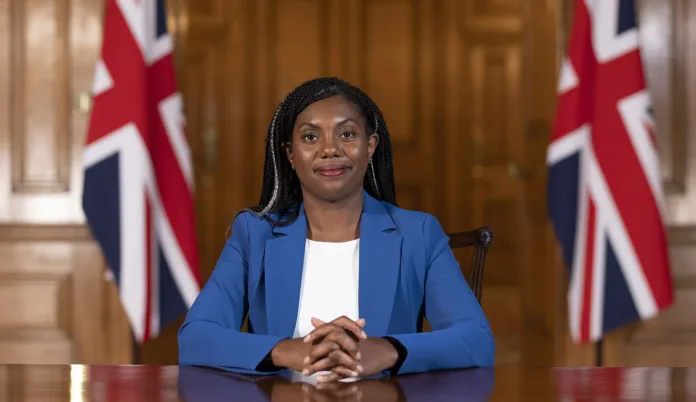Badenoch signals UK could quit more global accords after ECHR to speed up mass deportations
Kemi Badenoch has declared that a future Conservative government would be prepared to tear up more international treaties to increase deportations from the UK, in what she called a “necessary step” to regain border control.
Speaking at the Conservative party conference in Manchester, Badenoch announced plans to pull Britain out of the European Convention on Human Rights (ECHR), describing the move as part of a “wider bonfire of protections” that would include scrapping legal aid in immigration cases and ending migrants’ rights to appeal deportation through tribunals or judicial review.
Her speech set an uncompromising tone at the start of a conference almost entirely dominated by immigration. She told party members that leaving the ECHR was only the beginning. The UK, she said, must also be ready to quit or amend other international agreements, including potentially the 1951 UN Refugee Convention.
“Leaving the ECHR is a necessary step, but not enough on its own,” Badenoch said. “If there are other treaties and laws we need to revise or revisit, then we will do so – calmly and responsibly, but decisively.”
The announcement follows a legal review led by Lord Wolfson, the shadow attorney general, who concluded that staying within the ECHR places “significant constraints” on deportation policies. His report formed the basis for the party’s radical immigration platform, unveiled just before the conference began.
Embed from Getty Images
Under the proposed plans, asylum seekers arriving illegally would be deported within a week to their home country or a designated “safe third country.” The Conservatives also promised to establish a new “removals force”, modelled on Donald Trump’s ICE agency in the United States. With double the current deportation budget, this taskforce would aim to remove 150,000 people a year – roughly three-quarters of a million during the next parliament.
Shadow home secretary Chris Philp, speaking immediately after Badenoch, said the party would also deport any foreign national expressing racial hatred, supporting extremism, or spreading antisemitism. It was not immediately clear whether this would apply only to convicted offenders.
Philp’s speech was punctuated by lists of crimes committed by asylum seekers, framed as evidence of what he called a “broken system.” “This is sick,” he told the hall. “We must do whatever it takes to end this madness.”
Badenoch, striking a similarly hard-right note, said Britain had “tolerated radical Islamist ideology” for too long and warned against “importing values hostile to our own.”
Her pledge to quit the ECHR marks a historic policy shift for the Conservatives and a sharp departure from Britain’s post-war role as an architect of European human rights law. It also places the UK on a potential collision course with international partners, particularly the EU and Ireland, as the ECHR underpins the Good Friday Agreement.
Badenoch acknowledged the Northern Ireland dilemma directly, saying she had asked Alex Burghart, the shadow Northern Ireland secretary, to examine the implications.
The speech contained few surprises beyond the escalating rhetoric. Badenoch reiterated that the party must learn from its 2024 election defeat, promising that the next manifesto would “deliver results, not promises.” She also distanced herself from Liz Truss’s mini-budget, vowing never to repeat the “financial irresponsibility of spending without saying where the money comes from.”
But immigration dominated. For Badenoch, quitting the ECHR was not just symbolic — it was the centrepiece of her promise to restore national sovereignty over borders. “We will leave the ECHR and repeal the Human Rights Act,” she declared. “That commitment will be in our next Conservative manifesto.”
The reaction among moderates was muted, with some privately warning of legal chaos and diplomatic fallout if the UK abandons human rights conventions wholesale. But for Badenoch’s supporters, the message was clear: she intends to redefine Britain’s place in international law — even if it means standing almost entirely alone.
